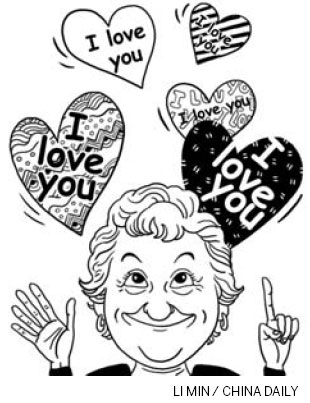'I love you' - It's easy and says a lot
By SANDRA LEE ( China Daily ) Updated: 2010-05-11 09:31:43
When I was a new teacher in China, every day I taught English to my students and they taught me about China. One day the topic turned to saying: "I love you." I was shocked to learn that not one of my students had said this to their mothers, nor had their mothers said it to them.
"Does your mom love you?"
"Of course," they chorused, a bit offended that I'd even asked.

"How do you know?" was my logical question. They responded that their moms cooked and always told them what they were doing wrong to show their caring. I was stunned. So mom's cooking and criticizing read out as "I love you".
How do you say "I love you" to her? They agreed that getting good grades, followed by good jobs and then marrying and having that precious grandchild would be how they showed their love.
I come from a culture where most people would find that not expressive enough, so I repeated these queries in classes over time. Gradually, I began to get different responses. Some of them had exchanged those sentiments with their moms.
One of my favorite stories of change came from a young woman. When she came home from university, her mother met her at the door and hugged her. This had never happened before, but her mom said: "Now that you have gone I have more time to myself and I watch TV more. I noticed that in some places mothers and children hug each other and I decided it was a good idea and that I would begin hugging you."
Usually the changes come from the younger generation, but in this case the college student's mother was the agent of change!
One class included an older man who is a scientist and represents China in prestigious conferences all over the world. He revealed that he had never said those words to his wife, nor had he ever brought her flowers. I teased him that the reason he didn't is because she would be suspicious and ask him what he had done! We all had a laugh, but in fact, he wasn't sure how she would react to such a gesture after so many years.

After he left the school, he wrote and told me that on his way to his house he stopped and bought her a bouquet. She was absolutely thrilled, and a new and wonderful way of saying "I love you" was established in their marriage.
Class surveys now reveal that younger women want to hear the magic words. They want romance in their lives. We all applauded the man in his 40s who said he does try to be romantic because it is clearly what his wife wants, although he is still a bit uncomfortable with tender expressions.
Since the women of today now look for that, the men who don't fight past their discomfort may find themselves out in the cold, maybe wondering why.
In my family we all say "I love you" a lot. While it is true that we often say the words without having a great depth of feeling at that moment, it is almost like a blessing we give each other. Recently, my daughter died unexpectedly and we are all so glad that the last words she heard from all of us were an almost automatic, "I love you."
Those three little words carry a world of meaning, even when said as a greeting, but most especially if they are the last words we say to or hear from those we love.
|
|
|
|
|
|
|
|


























 Raymond Zhou:
Raymond Zhou: Pauline D Loh:
Pauline D Loh: Hot Pot
Hot Pot Eco China
Eco China China Dream
China Dream China Face
China Face






